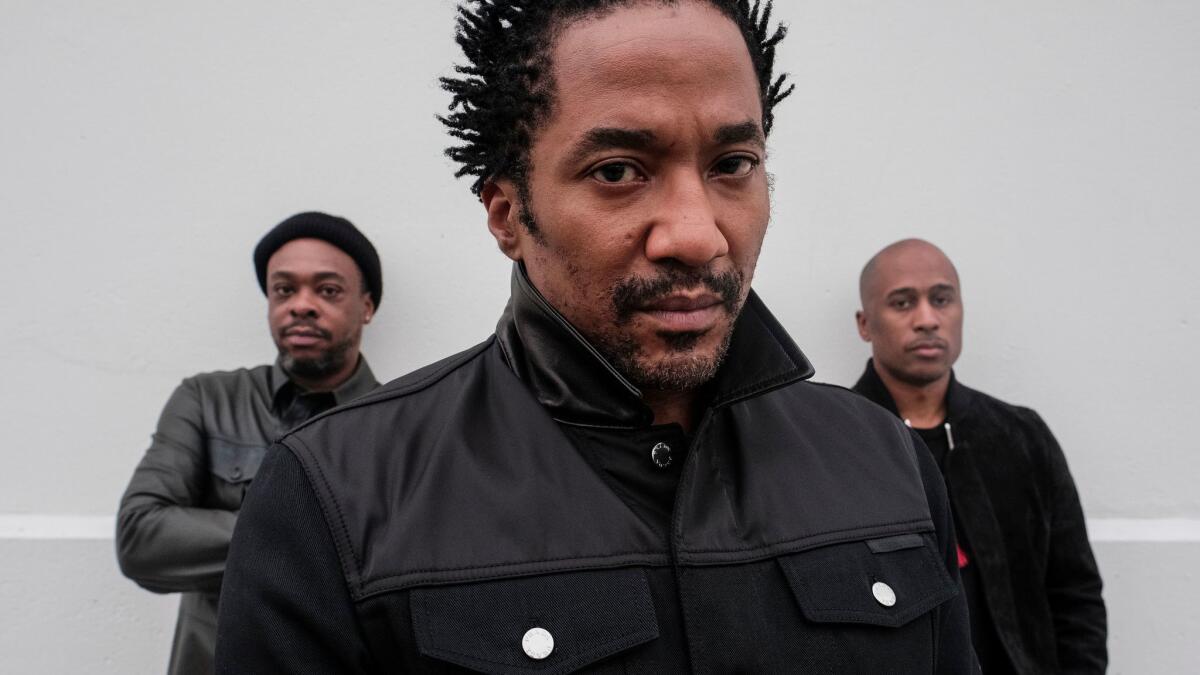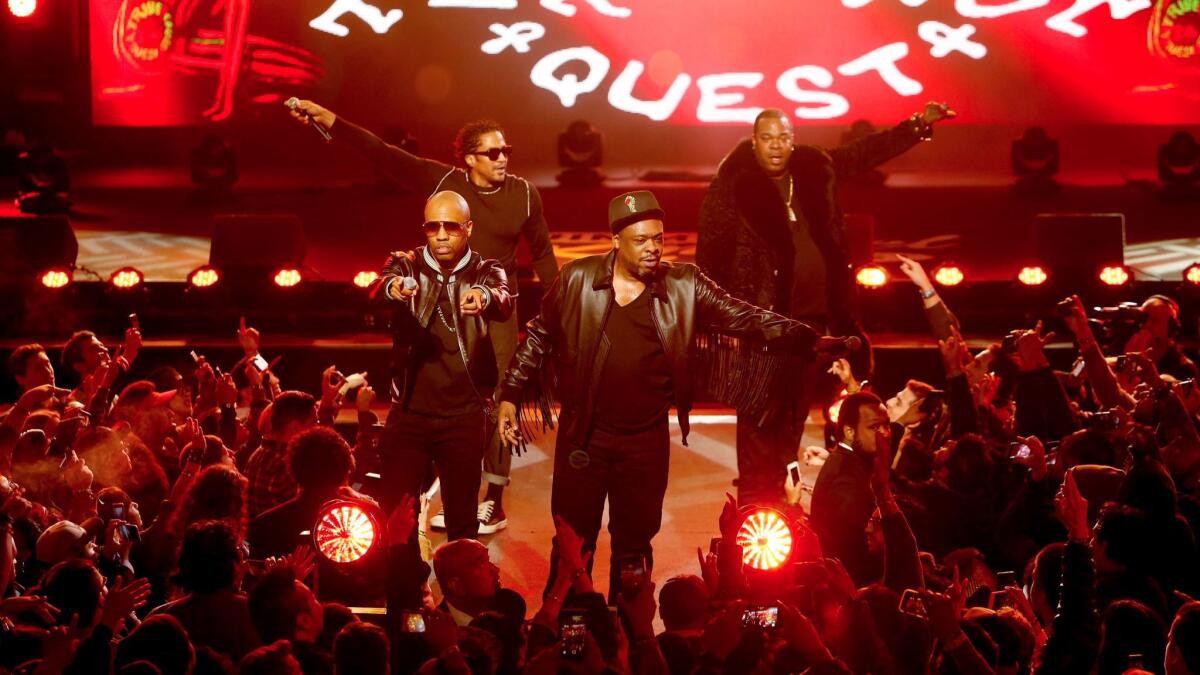‘This was divinely inspired’: A Tribe Called Quest on the year’s most surprising comeback

- Share via
Anyone walking along Highland Avenue on a recent Friday evening might’ve been alarmed by the sound blaring from behind the El Capitan Theatre.
“All you black folks, you must go,” cried several voices in rowdy unison. “Muslims and gays — boy, we hate your ways.”
A meeting of the newly emboldened alt-right?
Nope — it was A Tribe Called Quest, the reunited hip-hop outfit, performing its song “We the People…” on a large outdoor stage for “Jimmy Kimmel Live!” Full of stark images of “IRS piranhas” and police brutality, “We the People…” bitterly satirizes what the group’s mastermind, rapper and producer Q-Tip, referred to as Donald Trump’s divisive rhetoric.
Yet as Q-Tip and his bandmates ran through the song — and several more after the television cameras stopped rolling — their joy was undeniable, almost manic in its intensity. At one point, Busta Rhymes, the voluble barker who’s long served as a kind of honorary member of A Tribe Called Quest, crashed into view wearing a velvety pea coat and turned the scene into a riot of physical comedy.
What could have been an obligatory promotional appearance felt like a hard-won celebration.
That sense of shadowed jubilation pervades A Tribe Called Quest’s comeback album, “We Got It From Here… Thank You 4 Your Service,” which came out last month, just days after the presidential election that Q-Tip said had left many Americans with “huge, looming questions about the future.”
Given the grim topics the songs grapple with — racism, misogyny, drug abuse — the record’s uplifting vibe is a serious achievement — a testament to Q-Tip’s goal to “speak to something higher.”
But what makes “We Got It From Here” even more remarkable is that it follows an event that might’ve undone this influential group for good (and may still): the unexpected death in March of one of Tribe’s founding members, rapper Phife Dawg, of complications from diabetes.
“During recording, I’d do certain songs and then be like, ‘Nah, don’t be so dark with it,’ ” recalled Jarobi, the group’s second surviving rapper. (Tribe also includes producer and DJ Ali Shaheed Muhammad.) “We didn’t want it to be overwhelmingly sad. We’re celebrating Phife, not putting dirt on him.”
That doesn’t mean the album turns away from Phife’s death, which occurred as the band was at work on its first record since “The Love Movement” in 1998. In the stirring “Lost Somebody,” Q-Tip directly addresses his friend, recounting their shared childhood in Queens, New York, before lamenting that “now you riding out / Damn.”
But the lasting impression of “We Got It From Here” is the excitement the musicians were clearly taking in being around one another again — and at a moment when their work was being charged by troubling realities outside the walls of Q-Tip’s New Jersey studio.

Tribe’s evident team spirit is likely to surprise longtime fans who witnessed the sometimes-brutal discord captured by actor Michael Rapaport in his 2011 documentary about the group, “Beats, Rhymes & Life: The Travels of A Tribe Called Quest.”
The film follows Tribe, which broke up after “The Love Movement,” as the band reconvenes for a tour in 2008, then quickly splinters again in a struggle for control between Q-Tip and Phife.
At the time of the movie’s release, Q-Tip suggested that Rapaport hadn’t accurately depicted their relationship. Today, the rapper still downplays his and Phife’s beef, saying it was well within the norm for any two people who’ve basically known each other since birth.
Along with Jarobi and Muhammad, the men formed A Tribe Called Quest as teenagers, then emerged in the early ’90s with a pair of hit albums — “The Low End Theory” and “Midnight Marauders” — that showed off a sensitive but street-smart take on hip-hop, with funny, introspective lyrics and clever samples of old jazz records.
The group’s approach inspired younger rappers and producers like Pharrell Williams and Outkast’s André 3000; separately, each member stayed visible in hip-hop after they drifted apart.
But Tribe itself existed mostly as a fond memory until November 2015, when the group — looking for another late-night promotional opportunity — performed on “The Tonight Show With Jimmy Fallon” to call attention to a reissue of its debut album.
Like last month’s “Kimmel” appearance, the “Fallon” gig turned out to be more powerful than expected, and that energy propelled the four to begin putting new music together at Q-Tip’s studio.
The animating impulse, Jarobi said, “was definitely not nostalgia.” They were determined to write about current events — to “have the odometer on,” as Q-Tip put it, “feeling what’s happening around you.”
“Some people could see all that and be like, ‘Man, that’s too depressing — I wanna talk about’ ” having sex, Q-Tip said in harsher language. “They wanna escape from it. But we’ve always been cats who wanna make commentary.”
Sonically, too, they pushed at the limits of the group’s established style, calling in far-flung guests like Kendrick Lamar, Kanye West, Jack White and Elton John, who adapted a bit of “Bennie and the Jets” for the trippy “Solid Wall of Sound.”
With a laugh, Epic Records chief L.A. Reid said that every time he visited the studio, the tracks he heard sounded different. “I’d be like, ‘That’s the same song?’ ” Reid recalled. “And Tip would say, ‘Oh, you know, I did a little of this and a little of that.’ ”
Phife’s death brought progress to a standstill, of course. Reid said Q-Tip “shut down for a little while, just completely broken.”
But with the late rapper’s verses already recorded, the rest of the group eventually agreed they should complete the album.
“This was divinely inspired,” Jarobi said. “There was no way we weren’t gonna finish it.”
The result, which debuted at No. 1 and has turned up on dozens of year-end lists, shows off the group’s unique chemistry — the way Q-Tip’s dreamy philosophizing, for instance, mixes with Phife’s rougher-hewn sports jokes.
Indeed, the three surviving members struck very different figures in Hollywood the day after the “Kimmel” taping. Jarobi, who became a chef after he left Tribe, frankly discussed the nuts and bolts of restaurant life, while Q-Tip was given to grander talk about God’s role in the accidental wiping of one’s iPhone.
“ ‘Come, child, don’t get too crazy with your invention,’ ” he said, doing his best impression of a deity.
Muhammad, who now lives in Los Angeles and works as a music supervisor on the Netflix series “Luke Cage,” was nearly silent the entire interview.
Yet the three have a history that indelibly connects them. Even Muhammad nodded in happy recognition when Q-Tip recalled a long-ago night in L.A. that they spent with Tupac Shakur at a Bell Biv DeVoe concert at the Palladium.
As those names make clear, the fortysomething men of A Tribe Called Quest are now hip-hop elders. And that’s something else they were eager to embrace on “We Got It From Here,” which argues that rap music can say plenty about middle age — about its grown-up pleasures and its stinging losses.
Maturity, Q-Tip said, “is a gift. You’re more interesting at 38 than you were at 28.” He went on: “This country has a preoccupation with being young rather than being youthful — the age-defying creams and all that. Especially this town.”
The Rolling Stones came up as an example of an act that’s often derided for being too old.
“And they just made a bomb-ass blues album!” he said, referring to the band’s recent “Blue & Lonesome.” “You know it wouldn’t be as good if they were younger.”
But what about A Tribe Called Quest? The musicians have said they won’t make another album without Phife. Yet “We Got It From Here” makes you wonder what these guys might have to say at 50, 60, even beyond.
Asked again about the future, Jarobi answered, “I know there’s probably not gonna be a Tribe album because there’s no Phife. We can’t do that again. But this doesn’t feel like an end to me.
“What are we supposed to do? ‘Tip, unplug your machine.’ ‘Ali, put that guitar down.’ ”
“‘And don’t touch it!’” Q-Tip added. Then the three burst into laughter, another eruption of joy in the midst of grief.
Twitter: @mikaelwood
ALSO
The 10 best albums of a year defined by loss
The Rock and Roll Hall of Fame is evolving — very, very slowly
Why Post Malone has been called ‘the Donald Trump of hip-hop’
More to Read
The biggest entertainment stories
Get our big stories about Hollywood, film, television, music, arts, culture and more right in your inbox as soon as they publish.
You may occasionally receive promotional content from the Los Angeles Times.











